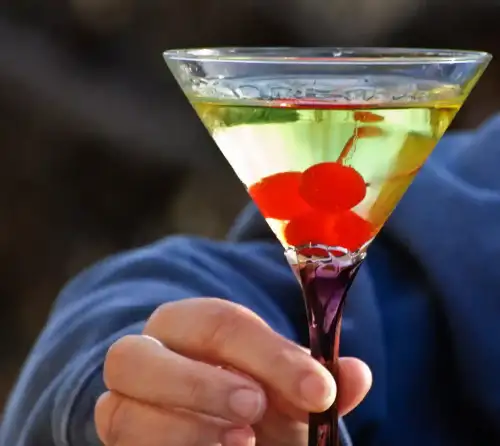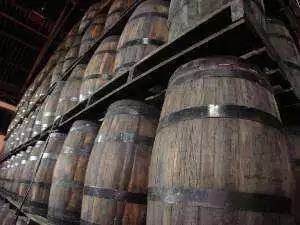.webp.e5762a087e9ec49f62859874987d86ce.webp)
Celiac.com 07/16/2013 - Gluten has a way of popping up in some very unexpected products. Peers (whether online or otherwise) are sometimes our best resource for information regarding these oft-overlooked gluten-containing products, but sometimes speculation gets passed along the grapevine as fact. This has led to some very believable, but ultimately questionable rumors. Alcohol in particular has some of the most persistent rumors regarding gluten content. This is likely because the processes involved with alcohol production are confusing and widely misunderstood. With this article, I hope to address and clear up a few of the most persistent gluten-free alcohol misunderstandings that you've certainly heard before.
Misunderstanding #1: “Not all wine is gluten-free: some vintners age their wine in barrels that are sealed with a wheat paste. This paste contaminates the wine, making it dangerous for consumption by celiac disease sufferers.”
Celiac.com Sponsor (A12):
This is a big one. Wine is naturally gluten-free, but the fact that some vintners use wheat paste to seal their barrels has led many to cut wine out of their diets as a precautionary measure. It's a plausible idea, as some vintners do in fact use wheat paste to seal their barrel heads. However, there are a few key points here that you should consider before cutting wine out of your diet entirely:
- Because the Tobacco Tax and Trade Bureau currently disallows gluten-free labeling of alcoholic beverages if the producer used “storage materials that contained gluten,” any wine that is labeled gluten-free was aged using a barrel alternative and carries no risk of contamination.
- Wines that aren't labeled gluten-free might still be aged using barrel alternatives. Roughly speaking, the more expensive ($12+) Cabernet Sauvignons, Merlots, Zinfandels and red blends are more likely to be aged in oak barrels (and for a longer period of time).
- The amount of wheat paste used to seal barrel heads is minimal. It is not the staves of the barrels that are sealed with a wheat flour paste, but the barrel heads. Furthermore, most wineries thoroughly pressure wash all barrels with boiling hot water before they are used. The last thing vintners want is a contaminated product.
In order to lay this contamination issue to rest, Tricia Thompson tested a single winery's Cabernet Sauvignon and Merlot, which she was told by the winery were their two wines that spent the most time in wheat-sealed oak barrels. She tested each wine four times: twice with the Sandwich R5 ELISA test, and twice with the competitive R5 ELISA test. The competitive R5 ELISA is the current standard for detecting hydrolyzed (broken down) gluten, while the sandwich R5 ELISA is the current standard for detecting non-hydrolyzed gluten (1). Combined, the tests can reliably test for any possible form of gluten contamination.
Both extractions of both wines came back with the lowest possible results for both tests:
-
Cabernet Sauvignon
Sandwich R5 ELISA extraction 1: < 5 ppm gluten
Sandwich R5 ELISA extraction 2: < 5 ppm gluten
Competitive R5 ELISA extraction 1: < 10 ppm gluten
Competitive R5 ELISA extraction 2: < 10 ppm gluten -
Merlot
Sandwich R5 ELISA extraction 1: < 5 ppm gluten
Sandwich R5 ELISA extraction 2: < 5 ppm gluten
Competitive R5 ELISA extraction 1: < 10 ppm gluten
Competitive R5 ELISA extraction 2: < 10 ppm gluten
Conclusion: Wine that is aged in oak barrels contains less gluten than we are currently capable of testing for, whether hydrolyzed or not.
At this point, a lot of people will begin to shake their heads: “If wine is gluten-free, then why do I get sick when I drink __________ wine?” The likely answer is that you are reacting to something else! Many winemakers use egg whites as a clarifying agent. The amount of egg used is far more substantial than any wheat paste that might have leaked into the wine, so if you know eggs are a problem, this is likely what you are reacting to.
If you don't have a problem with eggs, you could also be reacting to sulfites. Many people have problems with them, and some winemakers use them as preservatives.
Sometimes, it's best to go out and get information directly from the winemaker. They can tell you more about their aging process, and shed light on what may or may not be making you sick.
Misunderstanding #2: “Distilled spirits that are derived from gluten-containing ingredients can be contaminated with gluten. Only distilled spirits made from non-gluten-containing ingredients, like potatoes, are safe for consumption by celiacs.”
This idea was likely propagated due to a misunderstanding of the distillation process. Here, I will refer to Megan Tichy, Ph.D's highly informative and clearly written description of the distillation process (2). It is a great read for those who are unclear on the process, and makes it very evident why all distilled spirits are gluten-free by definition.
To borrow Dr. Tichy's analogy, the distillation process is like boiling a kettle of water with sand at the bottom of it. Let's say you were to collect the water that boiled away as steam using a condensing tube. After boiling the entire kettle away, you would be left with a kettle with nothing but sand at the bottom of it, and a second container of pure distilled water. There is no way the distilled water could contain any sand, as sand doesn't evaporate. In the same way, gluten doesn't evaporate, and gets left at the bottom of the 'kettle' during distillation. The likelihood of distilled alcohol being contaminated with gluten is about the same as the likelihood of you getting sand in your new cup of perfectly clean water: it would almost have to be intentional! Also keep in mind that many spirits are double, or even triple distilled. Gluten contamination over the course of a single distillation is already highly unlikely, but after consecutive distillations, it is virtually impossible.
To this, you might ask, “But what if they were to add other ingredients afterward? Those might contain gluten, right?” That's a perfectly valid concern, and yes, you should be concerned about any added ingredients. However, distilled spirits are almost always marketed based on their purity; this is why they go to all the trouble of double and triple distilling in the first place! Manufacturers of spirits want the most concentrated alcoholic product possible, so it is not exactly in their best interest (nor in common practice) to go adding more ingredients. Even so, you should always be mindful of ingredients lists, and cross check them against a reliable gluten-containing ingredients list (such as ours [3]).
Despite the fact that distilled spirits derived from grains are necessarily gluten-free, some people still seem to have problems with them. I don't have a ready explanation for this, as scientifically, it doesn't make sense. Celiac disease is triggered by gluten, and distilled alcohol contains no gluten. Here is a quick checklist to help rule out reasons why you may or may not react to such drinks:
[ ] Have you checked for cross contamination possibilities (glass, container, ice cubes, dish washing liquid, drying towel, etc.)?
[ ] Are you sure that you do not react to distilled alcoholic beverages that are not derived from grains (e.g. potato vodka)? (It could be a reaction to potent alcohol in general.)
[ ] Did you pour the drink yourself?
[ ] Are you sure you are not adding anything to the drink that could be cross contaminated or contain gluten?
[ ] Have you checked the ingredients list against a reliable gluten-containing ingredients list?
[ ] Have you considered any other allergies you have or might have?
[ ] Have you contacted the manufacturer for their official response regarding gluten content?
Oftentimes (especially soon after adopting GFD), the gut is still sensitive and cannot handle alcohol at high proof levels. If you had a bad experience with distilled spirits derived from grain early on in your GFD regimen, you might want to consider giving it another try after your villi have had a chance to heal. You really should not have a reaction once your gut is adjusted to the gluten-free diet. I know it is hard to trust a product derived from wheat, but distillation really, truly does remove all gluten, and it does so every single time.
Misunderstanding # 3: “'Low gluten' or 'gluten-removed' beers are unsafe, as gluten tests underestimate gluten content in beer. This is because the brewing process breaks the gluten molecules down into pieces that are too small for gluten tests to detect, but are still harmful.”
This is a point of fierce contention in the gluten-free community, and probably the most confusing argument to follow, as it all surrounds the validity of a variety of super scientific testing procedures. There isn't even a clear answer or 'winner' here, but I'm going to try and break all the information down for you, so you can make an informed decision about these products for yourself.
The main beef that people seem to have with gluten-removed beers is that they are derived from gluten-containing ingredients, and the gluten removal process is oftentimes undisclosed. This is an offshoot of the same distrust people feel toward distilled spirits, though perhaps a little more warranted given the fact that distillation is a very well documented and 100% reliable form of gluten removal, whereas as far as we know, these brewers are removing gluten using magic and fairy dust.
The reality is that these brewers (Widmer Brothers, Estrella Damm, Lammsbraeu, to name a few) are removing the gluten from their beer using one or the other, or perhaps a combination of two methods: filtration, and enzymes. Superfine filters can remove gluten particles from the beer, while added enzymes can target gluten particles, causing them to break down to a harmless state more quickly.
Whatever their methods, these beers need to have their gluten content verified using scientific testing procedures in order to be considered safe for consumption by celiacs. This is where things start to get murky.
As Tricia Thompson, MS, RD writes on her blog, Gluten-Free Dietitian, the current standard for testing gluten content in foods is a sandwich ELISA test (4). The R5 and omega-gliadin versions of the test are the most widely used, and both have been validated in collaborative trials.
While sandwich ELISA tests are reliable for detecting gluten in heated and non-heated food items, they are notoriously unreliable for detecting hydrolyzed gluten. Many see this as reason not to trust gluten-removed beers: the fermentation process hydrolyzes gluten in beer, so sandwich ELISA tests cannot accurately quantify their gluten content. If the test is unreliable, we are back where we started, with a once-gluten-containing product that has supposedly been rendered gluten-free by unexplained and unverifiable means; it's a hard pill to swallow!
However, the sandwich R5 ELISA's weaknesses are well documented and widely known. Most of these brewers are using an entirely different test that was specifically designed to detect partial gluten fragments (peptides) that may still be harmful to the gluten-sensitive. The competitive R5 ELISA is the standard test used to detect these peptides, and although it has not been validated yet, many published studies have found the competitive R5 ELISA to be a reliable indicator of hydrolyzed gluten (5) (6) (7).
This would all seem well and good since many of these beers test well under the proposed FDA limit of 20ppm gluten content with the competitive R5 ELISA. (As an aside, studies have shown 20 ppm to be an adequately conservative standard for most celiacs [8]). Unfortunately, the discussion doesn't end there. A recent Australian study tested a broad range of both beers brewed from alternate grains (sorghum, millet, etc.), and gluten-removed beers, and found that most gluten-removed beers contained significant levels of barley gluten (hordein) fragments, while beers brewed with alternative grains did not (9).
Many have inferred two things from this study: 1) gluten-removed beers are unsafe, and 2) R5 ELISA testing under-reports, or is incapable of testing for the barley gluten, hordein. I would posit that these are both hasty conclusions to make, as the study begs the following questions:
How much gluten are we talking about?
It isn't entirely clear from the study what 'significant' levels are, as it quantifies hordein levels on a relative scale, but not in terms of ppm. Yes, it is clear from the study that truly gluten-free beers contain less hordein than gluten-removed beers. It would also seem that some hordein families are just as present in gluten-removed beers as in standard beers whose brewers make no claims as to their gluten content. But this does not mean that any of the beers are over the 20ppm standard. The study actually states that the gluten-removed beers were tested to under 10 ppm, but then indirectly implies that they were not actually under that threshold. This is not necessarily true though! One recent study found that around 50% of standard beers on the market actually test to under 20 ppm gluten content (10). In other words, the average gluten content of beer is lower than you might think. Just because gluten-removed beers may be closer to the average on the study's relative scale than might look safe, this does not mean they contain gluten at levels that would be harmful to the average celiac. Furthermore, the toxicity of hordein and hordein peptides for celiacs still hasn't been conclusively quantified (11).
Is R5 ELISA really that unreliable?
The study also makes some interesting claims about the limits of R5 ELISA testing procedures. Specifically, it claims that “The R5 antibody is unable to accurately detect and quantify barley gluten (hordeins) in beer.” This is a slightly misleading statement. It is true that the sandwich R5 ELISA can be inaccurate when detecting hordein levels, but it actually overestimates them, so long as they are not hydrolyzed. Furthermore, that is the sandwich ELISA; there is much evidence to suggest that the competitive R5 ELISA provides an accurate measurement of hordein peptides (6) (7) (12). Conversely, this study employed multiple reaction monitoring mass spectrometry, a testing procedure that has not been validated for gluten testing of foods or fermented alcoholic beverages. I would say that the competitive R5 ELISA has a more proven track record when it comes to testing for hydrolyzed gluten in beer.
What does it all mean then? Should I drink gluten-removed beer or not?
Well, that's up to you, of course. As I said before, this is a hotly debated and highly contentious issue in the gluten-free world right now, so I'm hesitant to take one side or the other. If you suffer from refractory sprue, or some other severe form of gluten intolerance, I would advise you to stay away, as the risk simply isn't worth it for you. For more mild sufferers of celiac disease or wheat sensitivity though, if you really miss the taste of beer and gluten-free beers just aren't doing it for you, there is no solid evidence to discredit the results of competitive R5 ELISA testing. Find a beer that is batch tested to under 20 ppm using this test (not sandwich R5 ELISA, though it wouldn't hurt if it was tested by both), try a few sips, and see if you react.
I've tried to provide all the key information so you can make an informed decision about these beers for yourself, but it never hurts to do your own research! Just know that there are a lot of biased and outdated sources out there; the more recent and scientific the study, the better!
References:
(1) Thompson, Tricia, MS, RD. “Wine Aged in Oak Barrels Sealed with Wheat Paste: Test Results for Gluten Contamination.” GlutenFreeDietitian.com, 10 Oct. 2012. Web. 20 Dec. 2012.
(2) Tichy, Megan, PhD. “Distilled Spirits (Grain Alcohols) and Vinegar: Are they Gluten-Free?” Celiac.com, 26 Aug. 2009. Web. 20 Dec. 2012.
(3) Adams, Scott. “Unsafe Gluten-Free Food List (Unsafe Ingredients).” Celiac.com, 27 Nov. 2007. Web. 20 Dec. 2012.
(4) Thompson, Tricia, MS, RD. “Standards for testing food for gluten: Issues that need addressing.” GlutenFreeDietitian.com, 6 Aug. 2012. Web. 20 Dec. 2012.
(5) Thompson, Tricia, MS, RD. “Beer: Why it is so hard to assess fermented and hydrolyzed products for gluten.” GlutenFreeDietitian.com, 24 Jul. 2012. Web. 20 Dec. 2012.
(6) Gessendorfer, Benedict, et al. “Preparation and characterization of enzymatically hydrolyzed prolamins from wheat, rye, and barley as references for the immunochemical quantitation of partially hydrolyzed gluten.” Analytical and Bioanalytical Chemistry 395.6 (Nov. 2009): 1721-1728. Web. 20 Dec. 2012.
(7) Haas-Lauterbach, S, et al.”Gluten fragment detection with a competitive ELISA.” Journal of AOAC International 95.2 (2012): 377-381. Web. 20 Dec. 2012.
(8) Thompson, Tricia, MS, RD. “How much gluten is 20 parts per million?” GlutenFreeDietitian.com, n.d. Web. 20 Dec. 2012.
(9) Colgrave, Michelle, et al. “What is in a Beer? Proteomic Characterization and Relative Quantification of Hordein (Gluten) in Beer.” Journal of Proteome Research 11.1 (2012): 386-396. Web. 20 Dec. 2012.
(10) Cane, Sue. “Gluten-free beer 2011. How is it made? How is its gluten content tested? And is it really safe for coeliacs?” FoodsMatter.com, 2011. Web. 20 Dec. 2012.
(11) Thompson, Tricia, MS, RD. “Barley enzymes in gluten-free products.” GlutenFreeDietitian.com, Jun. 2009 (updated 3 Feb. 2011). Web. 20 Dec. 2012.
(12) Guerdrum, Lindsay, Bamforth, Charles. “Levels of gliadin in commercial beers.” Food Chemistry 129.4 (2011): 1783-1784. Web. 20 Dec. 2012.







Recommended Comments
Create an account or sign in to comment
You need to be a member in order to leave a comment
Create an account
Sign up for a new account in our community. It's easy!
Register a new accountSign in
Already have an account? Sign in here.
Sign In Now